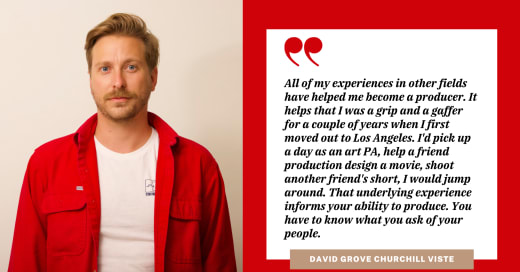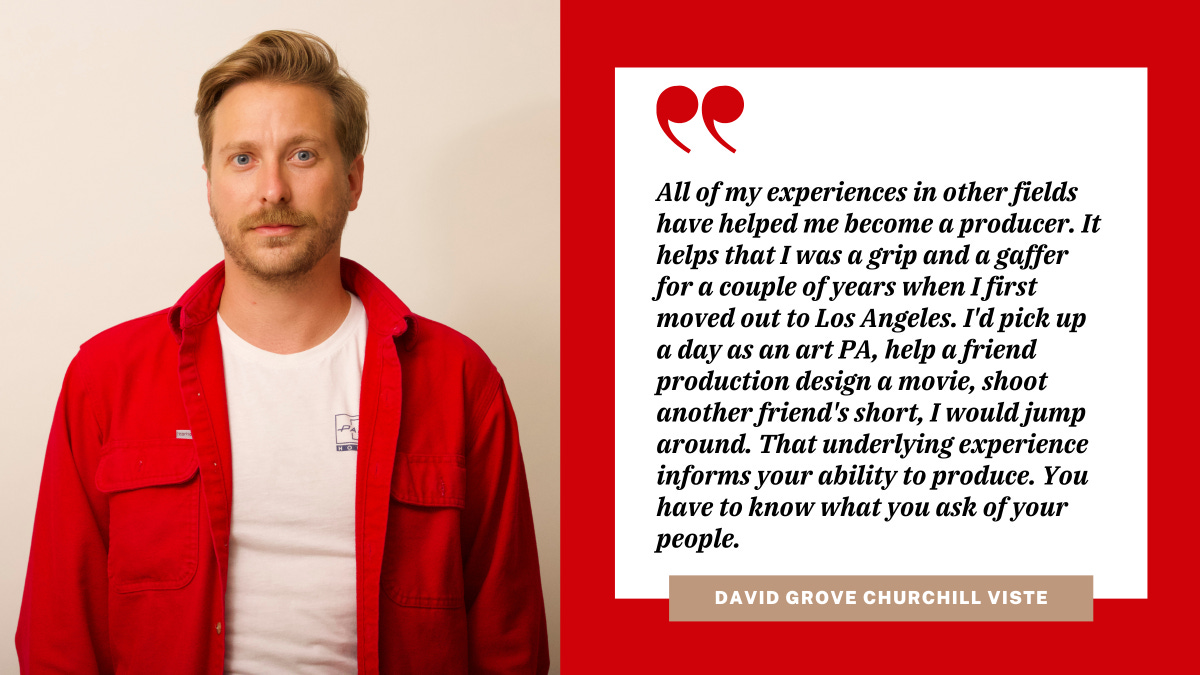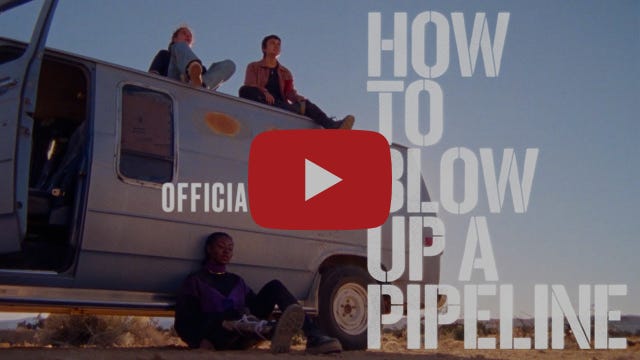A 2023 nominee for the Spirit Awards Producer Award and with more than ten years in the industry, producer David Grove Churchill Viste knows a thing or two about the changing marketplace for distribution. His most recent film, HOW TO BLOW UP A PIPELINE, premiered at TIFF 2022 with no distribution, then left as the only feature sold at the festival. This year, his feature BIRTH/REBIRTH, which premiered at this year’s Sundance, acquired distribution through Shudder arriving in Park City.
David sat down with Dear Producer and discussed the ever-increasing complications of financing and distribution, the value of having a producing partner, and where in his career he hopes to go from here.
In researching your career, I see that you’ve worked with Divide/Conquer and did some line producing and production managing early in your career. What was your foray into producing?
That was definitely my start in movies. I line produced the first movie that Divide/Conquer produced, LIKE SHARE FOLLOW, back in 2015. I worked with them multiple times over the years as a line producer and then in the producer capacity. I started the same as a lot of producers, doing commercials and music videos, cutting my teeth, and doing short-form stuff.
Before that, I was running Pollution Studios, which is a very small stage and gear house in downtown Los Angeles. I was 22, running around and doing everything. This compounded my education because it was a nuts-and-bolts course on how to run a company, which taught me how to produce. It also gave me an entry into many people in the industry because I was renting them gear and got to know people through that relationship.
Then I was at the premiere of TANGERINE in 2015, I’d been working on music videos and commercials, and I was bored. [laughs]. I bumped into Adam Hendricks, Greg Gilreath, and John Lang at Divide/Conquer. I hadn’t seen Adam in, I don’t know, a year or something. I said to him, “I’ve been in LA for five years. I want to make a movie. I want to be doing something other than branded content or music videos.” And he said, “What a coincidence. We have a movie we are putting together, you want to work on it?” [laughs] Then we had a meeting, and we started working together. They’ve been tremendous mentors and advocates for me and I’m hugely appreciative of them. I still end up on a call with Adam or Greg probably once a week.
In terms of sustainability, line producers work on a weekly rate, usually make more than the producer, and can join the DGA and get healthcare. So why make the switch from line producing to producing?
For me, line producing was a means to an end. It was a learning experience that drove my career forward. It gives you incredible groundwork as a producer, but it is arguably one of the hardest jobs in the industry. Yes, you have the financial rewards of the DGA, healthcare, and consistent work. But also, all the shit falls to you, so to speak. It comes from the top down to you.
If there’s a problem from above that needs to be changed, you must address it. Similarly, all of the crew’s vitriol or dissatisfaction comes to you. You’re constantly trying to balance these two teams, make sure everyone’s happy, and make everything a cohesive and pleasant work environment.
I was a good line producer, but find certain elements of producing more rewarding. I like giving creative notes and having more dynamic input than a line producer is necessarily allowed to have. For me, that’s what really drove me forward. I’m interested in telling stories. I got into movies because I’ve always been obsessed with the medium since I was a child.
I remember watching animated films and asking my father, “How do they do that?” He told me they draw one frame and then the other, which was incomprehensible to me. Someone can’t possibly be drawing hundreds of thousands of frames. There’s no way any human could endeavor to do that. The realization that that is, in fact, how it’s done is what led me to start animating when I was in high school.
I was animating using Flash and Maya. I cracked Maya when I was 14 because I was also into programming. I was just a weird little dork. I was acting in plays and all my friends’ movies. I’ve always been obsessed with everything that goes into this medium.
I was talking to my producing colleague Mali Elfman last night, and she said, “As a producer, you are a jack of all trades, and you have to work with all the masters of their trade.” The role requires knowledge of everything to execute. That’s what I enjoy about producing. I’m not just rolling out of bed and answering emails to financiers or legal, although I am doing that, I’m still figuring out, “What does the G&E crew really need for this shoot?” And what does this story need to be successful? All of my experiences in other fields have helped me become a producer. It helps that I was a grip and a gaffer for a couple of years when I first moved out to Los Angeles. I’d pick up a day as an art PA, help a friend production design a movie, shoot another friend’s short, I would jump around. That underlying experience informs your ability to produce. You have to know what you ask of your people.
I do enjoy the aspect of having to learn something random on each project. On the film I produced last year, we needed to film an actor driving through a field of bison and I got to learn all about bison. But I will say the logistics of making these lower budget films is starting to become monotonous. It’s the same process over and over again, just with different people. When you’re stuck in the same budget level, there’s not much left to learn after a few movies. Lately, when people ask me how I’m feeling, the answer is “under-stimulated.”
I 100% percent get that. I used to do a lot of the accounting for my movies because I couldn’t afford a post-accountant. At a certain point, it feels like punishment. If I never have to open accounting software again, it will be too soon. I know the lulls that happen.
There’s also the pursuit of leveling up. That’s why we chase the next bigger and better opportunity. If you’re doing the same things over again, you’re doing it for more money or eyeballs to be on the movie.
Most of your films have some genre bend, whether horror, thriller, or mystery. Is that what you gravitate towards personally or is that a calculated business decision?
There’s a large degree to which it started as a business decision, it was the space I came up in, working at Divide/Conquer. That’s the community that I am most known in. I love horror, but I don’t know that it’s my end all be all. I grew up in the Middle East. My parents worked for humanitarian and non-profit organizations, mostly in the education development sector. My ultimate goal is to tell international political thrillers. If I can get anywhere, that’s where I’d want to end up.
The last movie I finished, BIRTH/REBIRTH, that just premiered at Sundance, is an all-female modern retelling of Frankenstein directed by Laura Moss. She had this incredible short, FRY DAY, that made the circuits a couple of years ago. Her next movie I’m trying to get off the ground with my producing partner Mali Elfman is called GORDON. It will be set in the 1980s so we’ll need a commensurate budget. It’s a really exciting story about a guy who’s been kept in an institution and told that he’s a psychopath his entire life. Then due to budget cuts, he’s let out. He wanders around Detroit trying to date women and ensure he doesn’t kill them.
Love that concept, especially because I live just outside Detroit and that is where we filmed IT FOLLOWS.
You mentioned Laura’s short film… At a certain point, most producers stop producing shorts, but I see you still work in that medium. What are the benefits of continuing to work on short films?
Shorts are useful in allowing new talent to be introduced. That’s where a short shines more than anything else. It’s like the working draft of an artist’s style. If you can glean that from a short, then it’s been successful. That’s also why shorts are useful, as far as I’m concerned, for the director or people starting out in various career positions.
I’m not opposed to continuing to work in them, but I don’t want to be on the set of a short by any stretch of the imagination. I would appreciate it if I could help put it together, then step away and let other people run it. I don’t want to haul crafty to set. How often have you heard, “Why are you doing a short for a hundred thousand dollars? Just make a feature. At least at the end of that, you have something you can sell.”
I made a feature for $30,000 while I was working at Sundance and the director was working at Anonymous Content. It was a 12 day shoot with two actors and four or five crew members that we filmed over Christmas break.
That’s incredible. Here’s the problem, though. This actually becomes part of the issue– you’re too good of a producer. What you did is you succeeded. You made a movie for $30,000, and then suddenly, investors are like, “Well, you guys can do it for less.” Every once in a while, someone makes a $30,000 movie or $100,000 movie then they say, “Wait, why don’t you do that again?” It’s great to pull that off, but it’s not sustainable to the long careers that we and our crews have in front of us.
What they don’t realize is that you run out of favors, which is how these ultra low budget movies get made. The longer your career goes on, the less possible it is to produce low budget films. The people who did you favors “grow up” and move on to bigger shows and make more money and are in a union.
I don’t have any favors left. It’s honestly about age brackets, too. When you start out, you are young, and everyone you know is young and hungry, and then 10 years later, everyone you know is married. Everyone you know has kids and a house. They’ve got to pay their mortgage, they’ve got to send their kids to private school, and the ability to do these favors is just melting away, so unless you make friends with a bunch of 20-year-olds, which feels weird, I think you are just capped by the necessity of the slow progression of life.
Shifting to Sundance… Your film BIRTH/REBIRTH, which screened at the festival, already had distribution with Shudder before its premiere. This approach is becoming more and more popular where festivals are used as a launching pad for the release rather than to sell the film. The old speculative strategy of raising equity to finance your film and then locking in a festival premiere to sell to a distributor is changing drastically. Festivals are starting to feel more like the marketing arm for distributors.
You hit it on the nose. I don’t know what’s to become of indie film because the model you’re talking about is essentially dying, if not dead. We just made HOW TO BLOW UP A PIPELINE, an indie film, and we took it TIFF in September 2022 and sold it to Neon at the festival. We were the only movie to sell during the festival. The only one.
That’s insane. Five years ago, if you’d gone to TIFF and no movies sold except for one, you would’ve been saying the sky’s falling. There are lots of great projects that are being left on the table to wither, or three weeks after the festival they get picked up for a pittance. If we keep going in that direction, financiers will stop financing movies because they can’t make their money back. It’s always been an intimidating proposition to make movies. It’s a high-risk endeavor for investors, but now it’s becoming almost foolish.
Then what is your strategy for putting together new movies in this current market?
I want to pivot into a broader space where I know I have distribution locked on the front end. I think anxiety is a reality, too. As a producer making a movie in this market, I don’t always know if I have the stomach for it. I don’t want to get my legs broken.
I’m in the process of delivering a movie right now and the lender comes at me and my producing partner in a threatening way every day.
Exactly. That anxiety of where the market is going… Are the financiers going to see their money back? Did I even make enough to justify all this anxiety and stress? These are not the things that I want to be worrying about anymore if I don’t have to. Now, I don’t want to see the death of indie cinema, but I also think there are so many platforms, distributors, and outlets for putting a film together in a responsible way.
You’ve mentioned your partner, Mali Elfman a few times. I don’t see her credited on all your films, is this a new partnership?
We just started working together. She just made her first feature as a director called NEXT EXIT, which premiered at Tribeca last year, produced by my friend Derek Bishe. Mali has been in the industry for a long time. She’s produced for years working with Karen Gillan and she’s incredibly good at this game. We get along fabulously.
Producing solo is not only an incredibly difficult experience, but a mentally isolating and taxing one because you’re the boss. I think people fail to recognize that you are alienated from the people around you when you’re shooting. If you have no producing colleagues, you’re alone for the duration of production because you don’t have time for anything else.
That’s not good for your brain. Some studies show that isolation reduces IQ. We’re social animals that maintain our faculties through interpersonal contact and socialization. When you reduce that, you lower your mental faculties. I’ve been the solo producer several times, and in the end, I felt drained and dumber.
On my last film I became friends with our production designer. We were in Minneapolis, which has an amazing food scene, so we tried all the great restaurants together. It was wonderful to have that social time and enjoy the city and take a break from work.
How rare is it to find someone you truly bond with within this industry and can work with and have a good time with? Our industry has too much of an ethos of living in fear and anxiety. It breeds from producers, it breeds from directors, and it breeds from HODs, right?
It’s like this, you get into a project, and suddenly everything is such high stakes you can’t fucking breathe. Everyone’s just on top of each other. I loved working with Mali because we fostered a relationship and an environment for the crew of, “It will all be okay. We’re going to make this happen.” You will not get fired if you give people that space to breathe. You can make a better movie that way. I think we did.
I’ve gotten to a stage in my career where I don’t get worked up that often. I’ve made so many movies and gone through traumatic personal experiences in life that things don’t phase me as much as they used to. And my calmness doesn’t mean I don’t care deeply about the project. There just comes the point where you learn to trust the process.
Lastly, Your bio talks about your love of sailing…
I started sailing when I was 10 at camp. Like you, I’m a Midwesterner. Despite growing up in the Middle East, my father’s from Wisconsin, so I spent my summers there. I grew up sailing on lakes with little sailfish and dinghies. Then when I was in high school, my family and I took sailing classes together, and we all got EASA certified. I actually lived on a boat for two years and would go to Catalina or fool around in the Pacific. Boats are incredible. They let you go anywhere because the Earth is 70% covered by water.
Simultaneously, all that stands between you and death is this vehicle. That’s why I like sailing. It allows you to unplug from everything else because when you’re on the water, if all of your focus isn’t on sailing, it could end badly.
All too often, if I’m having a bad day, I think, why don’t I buy a boat and sail to Tahiti?







